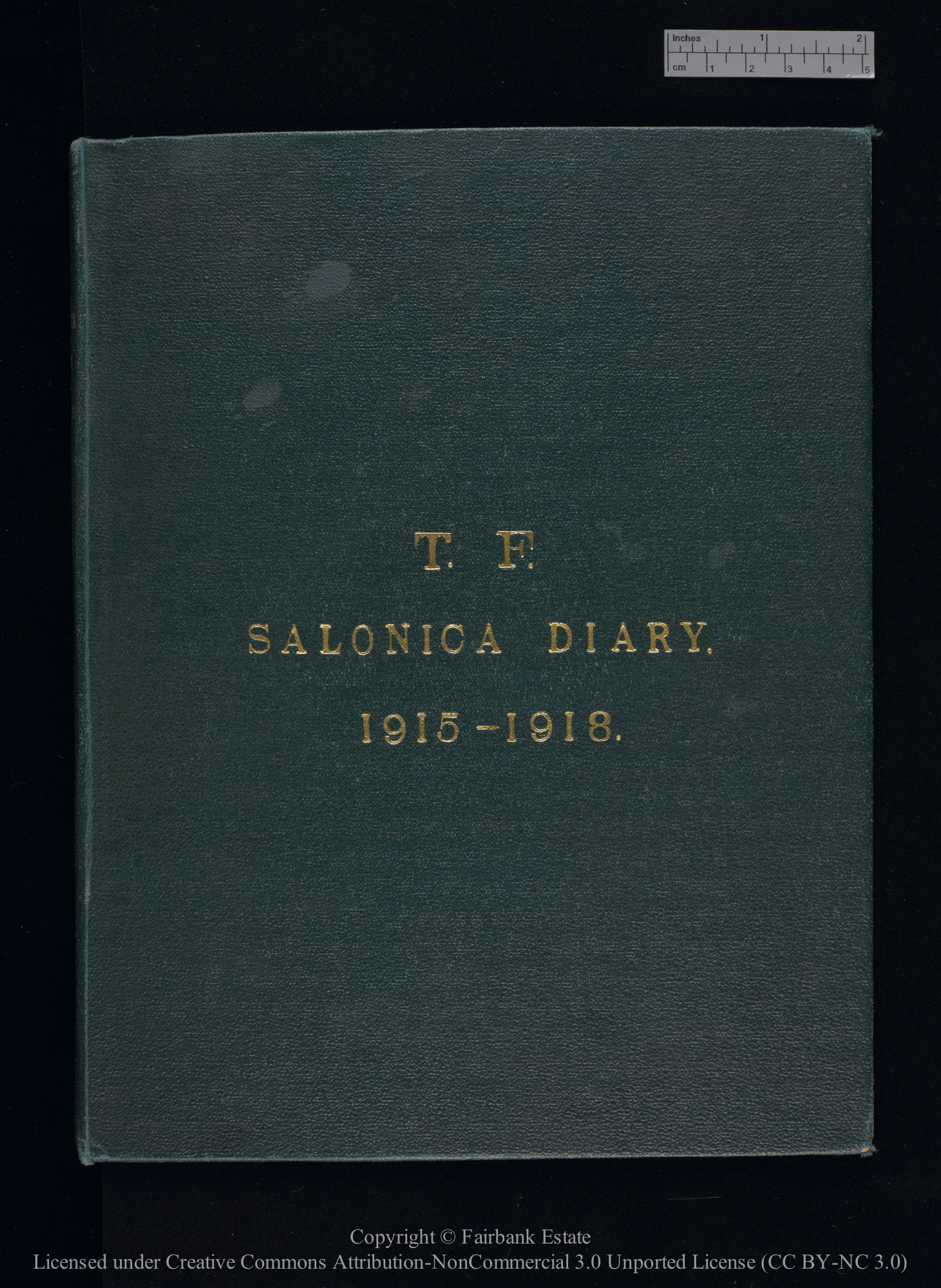Salonika Diary 1915-1918, 3 Dec. 1915 - 3 Jan. 1919
Scope and Contents
The bound volume contains a transcription of the diary entries found in the exercise books listed at MS Add.10082/7-8 and multiple items pasted into the volume. These include Christmas cards, programmes for sporting events and entertainments, photographs, clippings from newspapers and magazines, pencilled sketches by HATF, hand-drawn coloured maps, printed maps. The volume was assembled sometime after the First World War and contains a few non-contemporaneous notes and comments.
The 28th Division arrived in Salonika at the end of 1915 to join a combined Franco-British force which had arrived in October 1915 at the request of the Greek Prime Minister. The objective was to help the Serbs in their fight against Bulgarian aggression but the expedition arrived too late, the Serbs having been beaten before they landed. It was decided to keep the force in place for future operations but after December 1915 there was little action except for occasional air-raids on Salonika. During the first half of 1916 the British Salonika Force dug-in, creating a bastion about eight miles north of the city known as the 'Birdcage' on account of the quantity of wire used. At the beginning of October 1916 the British, in co-operation with her allies on other parts of the front, began operations on the River Struma towards Serres. The campaign was successful with the capture of the Rupell Pass and advances to within a few miles of Serres. An offensive was launched by Allied troops in April 1917 but failed and static trench warfare continued until September 1918 when Allied forces successfully broke through Bulgarian defences forcing the Bulgarian Army into full retreat. Bulgaria signed an armistice on 29 September 1918 and fighting ceased the following day.
The diary begins with disembarkation at Salonika on 3 December 1915 and the establishment of a camp. There are descriptions of digging trenches and dug-outs for wounded, the trying out of different methods of transporting casualties from aid posts over a terrain of rocky hills and deep gullies, and making preparations for handling wounded. Owing to the long periods of inaction the diary carries few reports of fighting or the treatment of casualties; instead there are descriptive accounts of activities undertaken during periods of rest. Living conditions for soldiers on both sides were harsh. Winter and summer brought extremes of climate and disease, especially malaria which caused many more casualties than fighting. HATF frequently remarks on the cold temperatures endured and the treatment of those sick with malaria and diarrhoea.
The diary carries reports of the autumn 1916 offensive from 10 September to 18 December when HATF returned to England for a period of leave; of HATF’s involvement in a serious railway accident involving a British troop train in France on 17 January 1918 which killed ten; the bombing of the 29th General Hospital in Salonika on 1 and 5 March 1917; and of the fire which destroyed two-thirds of Salonika from 18 to 20 August 1917.
After 11 March 1917 entries become less frequent with only eight entries from 1 April to 6 December. On 6 December 1917 HATF was promoted to Lieutenant Colonel and appointed as consulting surgeon to the British Salonika Force. His duties included visiting all field ambulance units, lines of communication hospitals (Casualty Clearing Stations and Stationary Hospitals), three General Hospitals and the Surgical Convalescent Depot once a week. There are no entries after 6 December 1917 until 4 August 1918.
On 20 August 1918 HATF was admitted to the 43rd General Hospital suffering from malaria where he remained until his departure on board the Hospital Ship, Goorkha on 18 September for a period of convalescence in Malta. HATF remained in Malta until 26 December 1918. The diary ends with HATF’s arrival in England on 3 January 1919. There are only five extremely brief entries from 20 August 1918 to 3 January 1919.
Dates
- Creation: 3 Dec. 1915 - 3 Jan. 1919
Creator
- From the Fonds: Fairbank, Sir Harold Arthur Thomas, 1876-1961 (Knight, Orthopaedic Surgeon) (Person)
- From the Fonds: Fairbank, Thomas John, 1912-1998 (Orthopaedic Surgeon) (Person)
Conditions Governing Access
The collection is open for researchers using Cambridge University Library.
Extent
1 volume(s) (1 volume)
Language of Materials
English
Subject
- SS Goorkha (1897-1928) (Organization)
Geographic
Repository Details
Part of the Cambridge University Library Repository
Cambridge University Library
West Road
Cambridge CB3 9DR United Kingdom
Map Dept enquiries: maps@lib.cam.ac.uk
all other enquiries: mss@lib.cam.ac.uk

